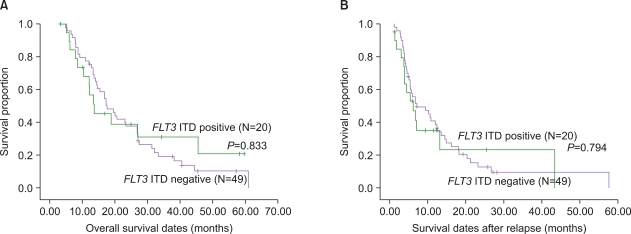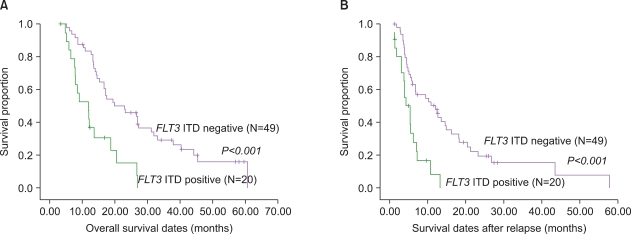Korean J Hematol.
2011 Jun;46(2):88-95. 10.5045/kjh.2011.46.2.88.
Prognostic significance of the FLT3 ITD mutation in patients with normal-karyotype acute myeloid leukemia in relapse
- Affiliations
-
- 1Department of Laboratory Medicine, University of Ulsan College of Medicine and Asan Medical Center, Seoul, Korea. hschi@amc.seoul.kr
- 2Department of Laboratory Medicine, Eulji University School of Medicine, Eulji General Hospital, Seoul, Korea.
- 3Department of Internal Medicine, University of Ulsan College of Medicine and Asan Medical Center, Seoul, Korea.
- 4Department of Pediatrics, University of Ulsan College of Medicine and Asan Medical Center, Seoul, Korea.
- KMID: 1782772
- DOI: http://doi.org/10.5045/kjh.2011.46.2.88
Abstract
- BACKGROUND
Fms-like tyrosine kinase 3 internal tandem duplication (FLT3 ITD) mutation is related to poor prognosis in normal-karyotype acute myeloid leukemia (AML). However, the prognostic significance of the mutation at relapse has not been adequately investigated. We investigated the prognostic significance of the FLT3 ITD mutation at relapse in normal-karyotype AML patients.
METHODS
We analyzed 69 normal-karyotype AML patients, in whom paired bone marrow samples taken at initial diagnosis and subsequent relapse were analyzed for the FLT3 ITD mutation at the Asan Medical Center between 1995 and 2009.
RESULTS
Forty patients showed a persistent wild-type genotype, 11 showed the FLT3 ITD mutation at diagnosis and relapse, and 9 lost and another 9 acquired the mutation at relapse. The mutation status at relapse affected the overall survival (OS), with the mutation group showing shorter OS and survival after relapse than the wild-type group did (P<0.001 and P<0.001, respectively), despite having received more frequent stem cell transplantation after relapse than the wild-type group did. However, no difference was detected in the OS and survival after relapse with regard to the mutation status at diagnosis.
CONCLUSION
The patients with FLT3 ITD mutation at relapse showed poorer prognoses than those without the mutation. However, mutation status at diagnosis did not affect the outcome. These results suggest that, in normal-karyotype AML patients with relapse, the prognostic significance of FLT3 ITD mutation at relapse is greater than that of the mutation status at diagnosis.
Keyword
MeSH Terms
Figure
Reference
-
1. Gilliland DG, Griffin JD. The roles of FLT3 in hematopoiesis and leukemia. Blood. 2002; 100:1532–1542. PMID: 12176867.
Article2. Brasel K, Escobar S, Anderberg R, de Vries P, Gruss HJ, Lyman SD. Expression of the flt3 receptor and its ligand on hematopoietic cells. Leukemia. 1995; 9:1212–1218. PMID: 7630197.3. Drexler HG. Expression of FLT3 receptor and response to FLT3 ligand by leukemic cells. Leukemia. 1996; 10:588–599. PMID: 8618433.4. Turner AM, Lin NL, Issarachai S, Lyman SD, Broudy VC. FLT3 receptor expression on the surface of normal and malignant human hematopoietic cells. Blood. 1996; 88:3383–3390. PMID: 8896403.
Article5. Birg F, Courcoul M, Rosnet O, et al. Expression of the FMS/KIT-like gene FLT3 in human acute leukemias of the myeloid and lymphoid lineages. Blood. 1992; 80:2584–2593. PMID: 1384791.
Article6. Carow CE, Levenstein M, Kaufmann SH, et al. Expression of the hematopoietic growth factor receptor FLT3 (STK-1/Flk2) in human leukemias. Blood. 1996; 87:1089–1096. PMID: 8562934.7. Stacchini A, Fubini L, Severino A, Sanavio F, Aglietta M, Piacibello W. Expression of type III receptor tyrosine kinases FLT3 and KIT and responses to their ligands by acute myeloid leukemia blasts. Leukemia. 1996; 10:1584–1591. PMID: 8847893.8. Levis M, Small D. FLT3: ITDoes matter in leukemia. Leukemia. 2003; 17:1738–1752. PMID: 12970773.
Article9. Hayakawa F, Towatari M, Kiyoi H, et al. Tandem-duplicated Flt3 constitutively activates STAT5 and MAP kinase and introduces autonomous cell growth in IL-3-dependent cell lines. Oncogene. 2000; 19:624–631. PMID: 10698507.
Article10. Yamamoto Y, Kiyoi H, Nakano Y, et al. Activating mutation of D835 within the activation loop of FLT3 in human hematologic malignancies. Blood. 2001; 97:2434–2439. PMID: 11290608.
Article11. Abu-Duhier FM, Goodeve AC, Wilson GA, et al. FLT3 internal tandem duplication mutations in adult acute myeloid leukaemia define a high-risk group. Br J Haematol. 2000; 111:190–195. PMID: 11091200.
Article12. Fröhling S, Schlenk RF, Breitruck J, et al. Prognostic significance of activating FLT3 mutations in younger adults (16 to 60 years) with acute myeloid leukemia and normal cytogenetics: a study of the AML Study Group Ulm. Blood. 2002; 100:4372–4380. PMID: 12393388.13. Kottaridis PD, Gale RE, Frew ME, et al. The presence of a FLT3 internal tandem duplication in patients with acute myeloid leukemia (AML) adds important prognostic information to cytogenetic risk group and response to the first cycle of chemotherapy: analysis of 854 patients from the United Kingdom Medical Research Council AML 10 and 12 trials. Blood. 2001; 98:1752–1759. PMID: 11535508.
Article14. Kiyoi H, Naoe T, Nakano Y, et al. Prognostic implication of FLT3 and N-RAS gene mutations in acute myeloid leukemia. Blood. 1999; 93:3074–3080. PMID: 10216104.15. Kottaridis PD, Gale RE, Linch DC. Flt3 mutations and leukaemia. Br J Haematol. 2003; 122:523–538. PMID: 12899708.16. Thiede C, Steudel C, Mohr B, et al. Analysis of FLT3-activating mutations in 979 patients with acute myelogenous leukemia: association with FAB subtypes and identification of subgroups with poor prognosis. Blood. 2002; 99:4326–4335. PMID: 12036858.
Article17. Mead AJ, Linch DC, Hills RK, Wheatley K, Burnett AK, Gale RE. FLT3 tyrosine kinase domain mutations are biologically distinct from and have a significantly more favorable prognosis than FLT3 internal tandem duplications in patients with acute myeloid leukemia. Blood. 2007; 110:1262–1270. PMID: 17456725.
Article18. Whitman SP, Ruppert AS, Radmacher MD, et al. FLT3 D835/I836 mutations are associated with poor disease-free survival and a distinct gene-expression signature among younger adults with de novo cytogenetically normal acute myeloid leukemia lacking FLT3 internal tandem duplications. Blood. 2008; 111:1552–1559. PMID: 17940205.
Article19. Mead AJ, Gale RE, Hills RK, et al. Conflicting data on the prognostic significance of FLT3/TKD mutations in acute myeloid leukemia might be related to the incidence of biallelic disease. Blood. 2008; 112:444–445. PMID: 18606888.
Article20. Rau R, Brown P. Nucleophosmin (NPM1) mutations in adult and childhood acute myeloid leukaemia: towards definition of a new leukaemia entity. Hematol Oncol. 2009; 27:171–181. PMID: 19569254.
Article21. Ferrara F, Palmieri S, Leoni F. Clinically useful prognostic factors in acute myeloid leukemia. Crit Rev Oncol Hematol. 2008; 66:181–193. PMID: 17996460.
Article22. Huang Q, Chen W, Gaal KK, Slovak ML, Stein A, Weiss LM. A rapid, one step assay for simultaneous detection of FLT3/ITD and NPM1 mutations in AML with normal cytogenetics. Br J Haematol. 2008; 142:489–492. PMID: 18477048.23. Chillón MC, Santamaría C, García-Sanz R, et al. Long FLT3 internal tandem duplications and reduced PML-RARalpha expression at diagnosis characterize a high-risk subgroup of acute promyelocytic leukemia patients. Haematologica. 2010; 95:745–751. PMID: 20133893.24. Cloos J, Goemans BF, Hess CJ, et al. Stability and prognostic influence of FLT3 mutations in paired initial and relapsed AML samples. Leukemia. 2006; 20:1217–1220. PMID: 16642044.
Article
- Full Text Links
- Actions
-
Cited
- CITED
-
- Close
- Share
- Similar articles
-
- Prognostic Significance of FLT3 Internal Tandem Duplication in Acute Myeloid Leukemia with Normal Karyotype
- FLT3 Internal Tandem Duplication in Acute Myeloid Leukemia with Normal Karyotype
- Prognostic significance of nucleophosmin mutations and FLT3 internal tandem duplication in adult patients with cytogenetically normal acute myeloid leukemia
- Prevalence of FLT3 Internal Tandem Duplication in Adult Acute Myelogenous Leukemia
- High Transcript Level of FLT3 Associated with High Risk of Relapse in Pediatric Acute Myeloid Leukemia



